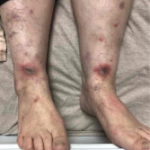Rheumatologists on the AHA statement and how to balance NSAID risks and benefits
Search results for: psoriatic arthritis
New and Updated Patient Education Materials Available
The ACR is continually updating and increasing its collection of patient education materials, or fact sheets. One of the newest fact sheets, “Pregnancy and Rheumatic Disease,” discusses the complex interactions of pregnancy and rheumatic diseases, acceptable medications to use during pregnancy and breastfeeding and helps to define what constitutes a high-risk pregnancy. The fact sheet offers links to additional resources and educational materials.

A Primer on Imaging in Myositis
In medicine, as in advertising, pictures can be worth a thousand words. From arthritis to vasculitis, imaging studies have been variably employed to aid in the diagnosis, treatment, risk stratification and prognostication of patients with rheumatic and musculoskeletal disorders. The same holds true with the idiopathic inflammatory myopathies (IIM), in which the clinical utility is…

Changing Treatment Patterns for Patients with JIA
A study from Glerup et al. demonstrated that many patients with juvenile idiopathic arthritis achieved drug-free remission over 18 years of follow-up and that remission rates remained stable between years 8 and 18 of the study period.

How to Avoid Cognitive Errors in Rheumatology
The 1999 Institute of Medicine report To Err Is Human gave a sobering depiction of the magnitude and consequences of medical error.1 The report concluded that approximately 98,000 people die in hospitals annually due to preventable medical errors. Of all the errors detailed in this report, diagnostic errors have since been determined to be the…

A Possible Diagnostic Tool: RheumMadness 2022 AI: JIA Subtypes Scouting Report
Machine learning is a tool that may help pediatric rheumatologists distinguish between different subtypes of juvenile idiopathic arthritis (JIA) and predict treatment response.

Reproductive Health, Beyond the Guidelines: Rheumatologists Must Think About Patients’ Psychosocial Needs
Experts discuss how rheumatologists must consider the psychosocial aspect of care in the decision-making process for women when addressing their reproductive health needs, in addition to medication safety.

Case Report: RA Patient Suffers Methotrexate-Induced Cutaneous Lesions
Methotrexate (MTX) remains the predominant medication used by rheumatologists to treat rheumatoid arthritis (RA). Doses of 7.5–25 mg per week with daily folic acid are generally prescribed. Despite its common use, MTX must be prescribed cautiously given the potential adverse effects when taken incorrectly or without folic acid supplementation. Cases of MTX-induced cutaneous ulceration have…

IV Meloxicam Stalls at FDA; Plus Health Canada Approves Risankizumab for Plaque Psoriasis
In a second response letter, the FDA has cited the onset and duration of intravenous meloxicam, a non-opioid pain treatment, as concerns that it fails to meet prescriber expectations…

Experts Discuss the Latest Precision Medicine Research
SAN DIEGO—In just two decades, precision medicine has gone from futuristic concept to realistic toolbox for clinical physicians. At the 2017 ACR Clinical Research Conference on Nov. 3, the Precision Medicine in Rheumatic Diseases: Hopes and Challenges lecture featured rheumatologists and experts on genetics, genomics, pharmacogenetics and big data who spoke about the latest research…